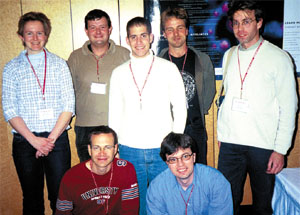
|
{
C O N T E N T S } Download Newsletter pdf |
|
RECOMB 2003
by Dr. Patricia Beziat The “Seventh Annual International Conference on Research in Computational Molecular Biology—RECOMB 2003” was held in Berlin, Germany, from April 10-13. It brought together more than 500 scientists from 33 countries working in the field of bioinformatics and computational molecular biology. “This year's conference was attended by an higher-than-average amount of students and young researchers”, said Martin Vingron, local organizer of RECOMB 2003. “Thanks to ISCB and the European Commission, we were able to provide 107 Student Travel Fellowships, enabling them to come to Berlin to present their work to the community.” The RECOMB 2003 program consisted of three components: the keynote lectures, the contributed talks and the poster session. Nine keynote speakers, each a leading expert of his/her field, allowed the audience a deep insight into a specific research area. A typical example was the lecture, “Biology and Bioinformatics on Halophilism,” by Dieter Oesterhelt. He took his audience to a journey into the world of halobacteria, extremely halophilic archaea living in habitats with extreme salt concentrations. Going through all the steps necessary to obtain the available biological data about one distinct halobacterium (data on microbiology, physiology, biochemistry and genetics), he led the audience to an understanding of what is necessary in order to model and simulate parts of cellular events of an organism and even a whole organism. David Haussler gave an exciting lecture entitled “Computational Analysis of the Human and Other Mammalian Genomes”. He presented a broad overview of the key bioinformatic analysis problems presented by the working drafts for the human, mouse and rat genomes. In addition, he outlined some of his work combining hidden Markov models, used in bioinformatics to analyse DNA from a single species, with continuous time Markov models of molecular evolution, used to reconstruct evolutionary history of several species. The second part of RECOMB 2003 consisted of contributed talks. The Program Committee, headed by Webb Miller, selected 35 papers out of 175 submitted for presentation at the meeting and inclusion in the Conference Proceedings. They were grouped in sessions dealing with expression data, networks, protein structure, sequence motifs, trees, sequences, proteomics, haplotypes and others. Amongst others, a talk by Derek Chiang about the theoretical analysis of the genomes of different yeast species has been one of the scientific highlights of RECOMB 2003. The talks were complemented by lively poster sessions. 183 extended poster abstracts outlined the broad spectrum of research in the field of Computational Molecular Biology and its medical applications. The abundance of different contributions enabled RECOMB 2003 to highlight developments in computational biology as well as important advances in experimental biology in the stimulating atmosphere of the conference. RECOMB 2003 honored two young researchers (PhD students) for their excellent contributions to the conference. Gill Bejerano (Hebrew University, Israel) has been awarded the “RECOMB 2003 Best Paper by a Young Scientist Award” for his paper “Efficient exact p-Value Computation and Applications to Biosequence Analysis”. He devised a branch and bound approach to efficient exact p-value computation, and applied it to a likelihood ratio test in a frequency table setting. With two applications he briefly demonstrated his proposed method to be readily extensible to other tests and test statistics of interest. Andres Figueroa has been given the RECOMB 2003 Best Poster Award for his poster “Clustering Binary Fingerprint Vectors with Missing Values for DNA Array Data Analysis”. In 2004, RECOMB will be held in San Diego from March 27-31, 2003. Dan Gusfield, Chair of the Program Committee, and ISCB Past President Philip Bourne, Head of the Local Organizing Committee, have already taken up their work, preparing for another RECOMB as challenging, vivid and stimulating as this year's conference.
|

